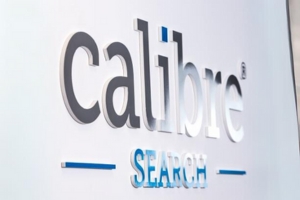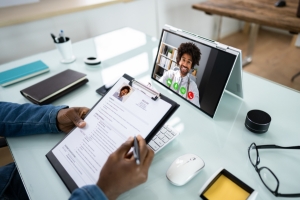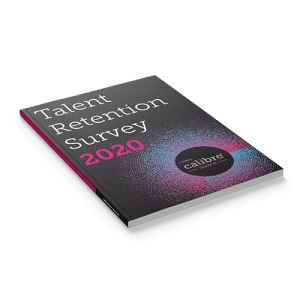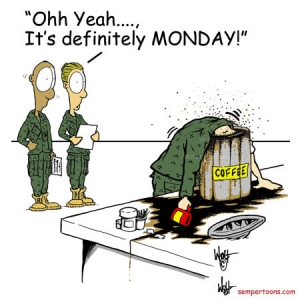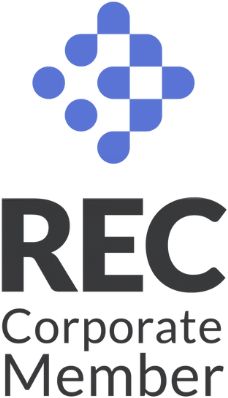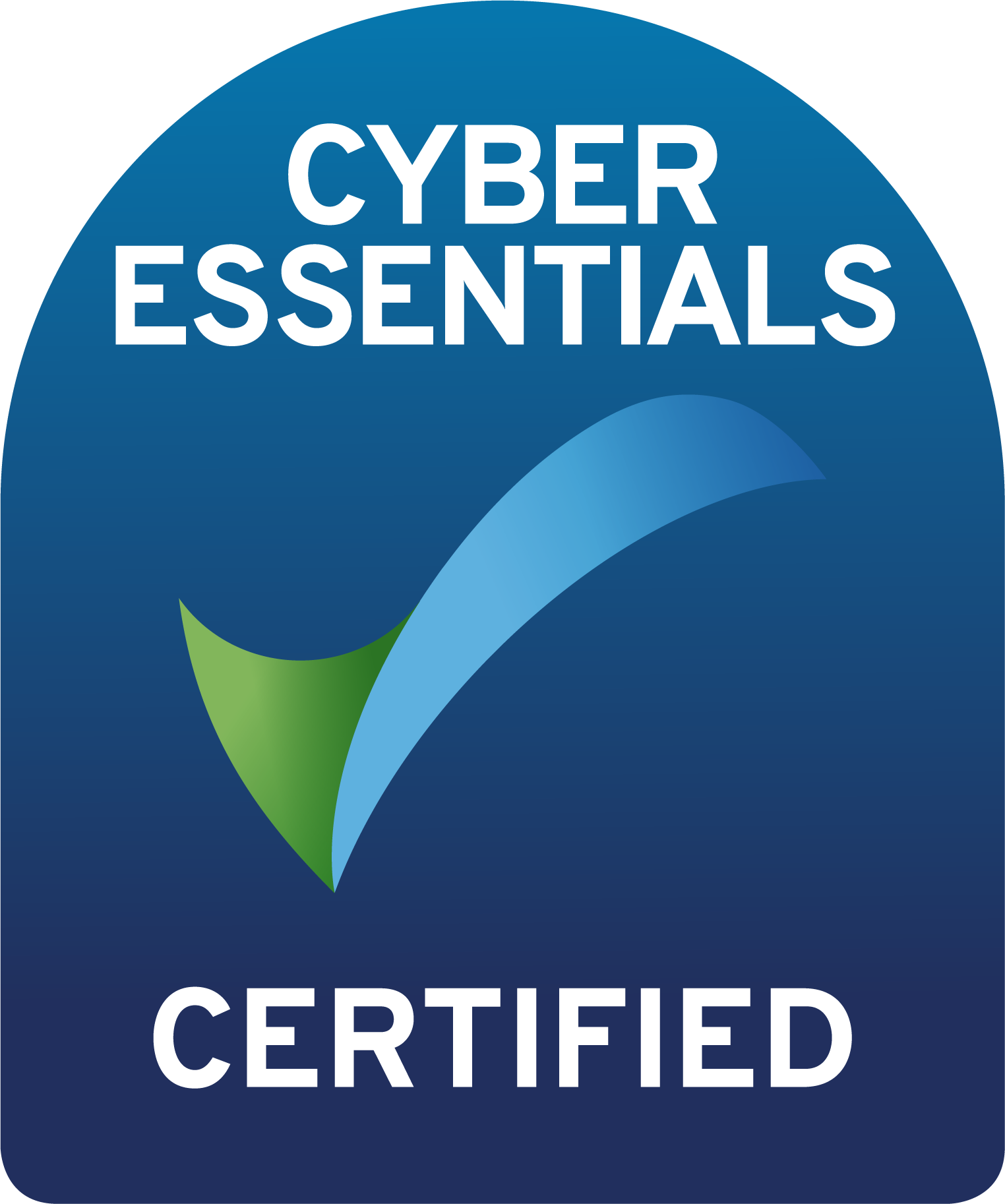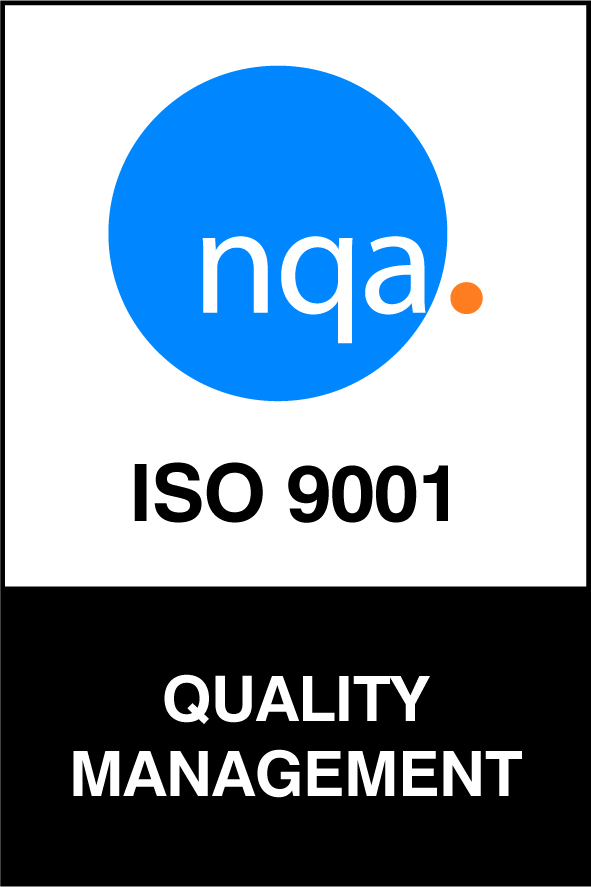Test Owner

While some businesses put recruitment on hold throughout the COVID-19 pandemic, others found their recruitment needs intensified and were forced to adapt quickly and hire remotely.
With more businesses considering remote recruitment to sustain business continuity, they're having to redefine their hiring strategy.
Times may be changing, but the need for talent is still prevalent and the means of finding candidates is challenging. Sourcing, interviewing, hiring, and onboarding new employees remotely is now a new way of business life as teams continue to be home-based, or as businesses transition to a hybrid home-office workforce. More and more businesses are starting to enjoy the benefits of adopting agile ways of working, and cherry picking from a larger and more diversified talent pool.
Adapt your onboarding process
An effective onboarding process makes employees feel valued, leading to increased engagement and retention. It gets them used to your company’s philosophies, ways of working, and the environment in general, and it gives them the right tools and training needed to become productive quickly.
Maintain a structured communication process from Day 1. Teams and individuals need to stay in the loop and always aligned, therefore regular communication via emails, calls, virtual meetings, and messages is imperative. Hold regular reviews and check in with individuals, to keep communication flowing. Set aside regular dates for virtual team meets to keep teams engaged and encourage social interaction.
And of course, you’ll need to invest in the right technology for your workforce.
The upsides of remote recruiting
- A wide and diverse talent pool
- Unbiased hiring (encouraging diversity)
- Consistent recruitment process
- Level playing field
- Improved time-to-hire / quicker turnaround if planned properly and executed effectively
- Overhead cost reduction (office, travel expenses)
- Increased employee retention - research shows remote workers stay longer
- Increased trust and flexibility - less micromanagement
- Increased level of engagement among employees
- Environmentally friendly (less travel)
- Measured results (employers are forced to measure results rather than attendance)
- Better health and well-being of employees (happier workforce)
The downsides of remote recruitment
- Prolonged process if planned poorly or not managed effectively
- Technical difficulties during the interview process
- Difficult to replicate in-person interviews (no personal interaction, candidate nerves, lack of gut feel)
- Risk of hiring the wrong person
- Lack of team communication
- Bottlenecks in work processes if the workforce is not aligned or communicating effectively
- Lack of human interaction / personal connection
- Culture challenges
- Language or time barriers
- Lack of face-to-face training / new employers learning from existing team members
- Challenges for management - new ways of working and managing remote employees
- Difficulty in tracking and measuring productivity or activity
- Lack of workplace camaraderie, social interaction, team spirit
- Increased spending on technology
How to restructure your hiring process for remote recruitment
Without face-to-face interaction during the hiring process, it’s more important than ever to have clear processes in place to recruit effectively. Here are some tips to get you started:
- Build a strong employer brand online to attract candidates.
- Create clear and accurate job descriptions, outlining roles, responsibilities, and expectations. Leave no scope for confusion.
- Get clear on exactly what you want and need from a candidate.
- Write accurate and engaging job adverts that stand out from your competitors.
- Appoint a single point of contact to maintain responsibility throughout the process.
- Implement an applicant tracking system.
- Ensure all hiring managers are aligned - agree on what you’re looking for, and what questions you all want to ask, create shortlisting criteria, agree on interview dates in advance, and so on.
- Choose the relevant technology to interview remotely, such as Zoom or Microsoft Teams.
- Utilise the record function so interviews can be replayed (for anyone who couldn’t be present). Also, handy when shortlisting, but consider data privacy obligations.
- Run online assessments or online exercises to help you make informed decisions about candidates’ skills.
- Get the whole team involved - ask your current team for input on what skills are missing from the team or what they need further assistance with.
- Choose wisely. Look for people who take initiative, have a high degree of independence, have a strong work ethic, are goal-oriented, are receptive to feedback, and who enjoy accountability. These types of candidates will likely align with your company’s values and beliefs.
- Maintain contact with candidates in the running - stay connected, keep them engaged, and keep them always informed of the progress of their application.
- Consider a job trial basis.
- Be thorough with pre-employment checks (such as ID checks, references, and certifications).
Stay ahead of the game
More and more businesses are adopting agile ways of working to thrive in an ever-changing world, and a huge part of this means redefining their entire recruitment strategy and embracing remote working. Recruiting a remote workforce is no walk in the park; it requires effective planning (optimising the hiring process), implementing the right technology (investment), and ensuring strong and consistent communication between teams (strong leadership), but if done properly, the benefits can far outweigh the negatives.
The question is, can you afford to get left behind?
If you want some advice on how to recruit remotely, we can help!
Call us:0333 323 0733
Email us: info@calibresearch.co.uk

We are recruiters in the FM industry, so you might wonder why we’re so interested in retention – we just want to place Facilities Management candidates, right? This is not the case at all. We are interested in working with companies who know how to keep their workforce happy – they are a much more attractive proposition for candidates and will have a naturally lower staff turnover rate.
It’s no secret strong candidate retention lowers costs, boosts morale, and increases productivity. But holding on to high-quality engineers takes more than just a competitive package. The marketplace is unforgiving, and you need to do all you can to attract and retain the talent your business needs to thrive.
Not sure where to start? Let’s begin with the facts.
Recruitment is an expensive and time-consuming process - from creating job descriptions and adverts, filtering CVs, interviewing candidates, negotiating offers, following up references, onboarding, and then training; it’s a huge undertaking for any business, but more so for one in an industry that sees a high turnover of staff. Recruiters can help with a lot of this, but hiring new staff members is still something you don’t want to do more than you must.
Why is employee retention so important?
In a candidate-driven market, quality FM engineers are in high demand, and companies continue to compete for their attention when they come onto the job market, as well as using measures to entice them away from their current workplace. Good quality engineers are not only hard to find, but they can also be hard to keep. Optimise your recruitment and retention plans and you’ll be ahead of the pack.
Optimise your hiring strategy
Good acquisition leads to good retention. If there’s a misalignment between the candidate and the organisation (for example the candidate realises there is more travel than initially anticipated), or if they’ve covered up some shortfalls in their skills/experience, the chances of the hire working out are greatly reduced.
Get clear on what your ideal candidate looks like, and interview strategically. Ensure their long-term goals and cultural needs are aligned with what you’re offering and get a feel for whether they’re genuinely interested in your company. Pay close attention to why they left previous jobs, ensure you follow up on references, and look out for any red flags.
If you think you’ve identified a candidate who will stay the course, don’t delay in making that offer! Time is of the essence here, and having a long, drawn-out interview process or taking your time producing a written offer, can mean the difference between you getting the engineer you want, or your competitor getting them first. We see companies lose out on engineers all the time because of a delayed interview/offer process.
How to improve your staff retention strategy
Employees want more than just a paycheque, and when it comes to retaining an established workforce there are many other things you can consider. We share our best advice from more than 15 years in the FM recruitment industry. You may not be able to introduce all these quickly, but these are the things we believe will help make people stay:
1-Structure your onboarding process
Research shows an effective process makes employees feel valued, leading to increased engagement and retention. It acclimates them to their role and the company’s philosophies and gives them the right tools and training needed to become productive quickly and fulfil their role effectively. Having a clear structure not only shows that you are an organised business, but it also shows to your newest recruit that you are invested in their role.
2-Create a clear path for professional development
Opportunities for advancement in terms of role, seniority, training, and pay increases remain high on the list when it comes to what candidates want (we know, we’ve surveyed 250 of them in the last 12 months!).
3-Keep your salaries competitive!
Employees may be satisfied in their role, but if a competitor offers considerably more, they’re likely to move. It can be tempting to let them go and find a cheaper replacement, but it will cost the business substantially more in the long run due to interviewing, onboarding, and training. Also, keep it simple when it comes to the structure of your packages, feedback we’ve received is that complicated packages are often seen as a negative when assessing a role.
For insights on market salaries, please contact us here.
4-Offer the right benefits
Whether it’s financial rewards, holiday entitlement, pension, sick pay, or overtime, it’s worth investing time to consider what could be a cost-effective way to keep your engineers happy.
5-Foster a positive company culture
Create an environment that your employees want to be part of. How do you know what that looks like? Ask current employees and ask potential ones during interviews. Observe what’s currently good and what’s not.
6-Communicate openly
Keep lines of communication open so employees can voice their ideas, questions, or concerns. Be available for them and you could even offer yearly surveys that can identify any widespread concerns.
7-Promote teamwork and collaboration
Celebrate individual, team, and company achievements. This will help bring the team together and make every recruit feel involved and appreciated.
8-Encourage and support a healthy work-life balance
Post-covid, people are reflecting on what’s important to them, and work-life balance is creeping its way up the list. The HVAC industry can be demanding, and many engineers want overtime but being asked to work too much is a common theme for engineers leaving roles.
9-Implement a mentorship programme
Allow senior employees to act as role models for new or junior employees, giving them a sense of responsibility and appreciation, and giving the recruit someone to turn to and learn from.
10-Hold regular reviews and give feedback
Humans thrive on positive feedback and praise, and everyone wants to feel respected and heard. From weekly catchups to quarterly reviews, giving regular feedback will give the recruit opportunities to develop and thrive in their new role.
11-Invest in the right tools and technology
Candidates report that having the right tools and technology to do their job easily and effectively is important to them. It provides greater job satisfaction and productivity than if they had to work with old or ineffective tools.
12-Put data to work
Use data from employee surveys or exit interviews to identify any patterns relating to employees leaving. When do they tend to leave? Why? Act accordingly to resolve the common issues.
Why use a Recruiter to find your next HVAC Job?
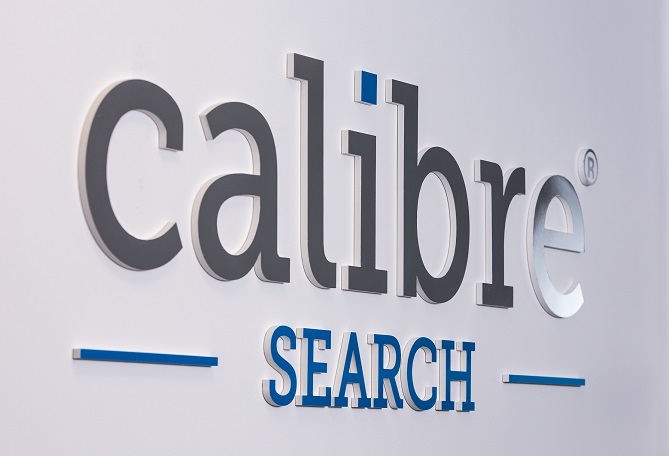
Why Use a Recruiter For Your Next HVAC Job?
You’ve made the decision. Things aren’t quite working out in your job, whether it’s the hours, the travel, the pay; whatever the reason, you know it’s time for your next move.
One question on your mind is likely to be ‘should I use a recruiter?' You can search the job boards and apply for relevant jobs yourself of course, but there are enormous benefits to using an experienced HVAC recruiter.
9 Ways a Recruiter Can Help You
Looking for your next HVAC or refrigeration career move can be daunting, especially if you’ve been in your current job for a long time.
Recruiters who know the HVAC market will speak to dozens of individuals in your situation every week and just as importantly dozens of recruiting managers. We can help you understand what’s a sensible approach, what financial packages are on offer and how to get the best role for you.
A recruiter can help in several ways:
- Market knowledge – specialist recruiters who work exclusively in the HVAC and refrigeration sector, will know the market inside out. They know who the top companies are, who are the best employers (and perhaps those who aren’t) and whether they are looking or not. This can save you a lot of time.
- Using a recruiter that knows the market and the relevant companies means they can get your CV straight to the hiring manager and then chase them for feedback – this can be the difference between getting an interview or not and also will save you time filling out an application form for each company.
- Recruiters often know who’s recruiting before the jobs have been advertised so they can put you forward before the wider job-seeking public. HVAC and refrigeration is a busy market and often it’s easier for recruiting managers to ring a trusted recruiter than it is to write an advert, get it approved internally and wait for responses. We’ll also ensure that your CV gets in front of the right person in the quickest possible time
- Choosing the right job to go for – no one likes wasting their time. You don’t want to apply for or travel to interviews for jobs that aren’t right for you. If you apply directly, you might not realise the fit isn’t right until you’ve spent hours filling in application forms, or worse travelling the country to go to an interview. Recruiters can work with you to decide which roles are right (our live HVAC jobs are here by the way).
- Interview preparation and coaching – you’ll get advice on what to expect at interview and which areas of your experience you might want to highlight. Your recruiter will help you through it and let you know what the company is looking for in potential employees.
- CV advice – recruiters know how to structure a CV to make sure it is seen by and appeals to hiring managers.
- Negotiating the right package for you – as you know, it’s not always about the basic salary. With HVAC and Refrigeration roles there are on-call rates, travel time, over-time and even pension contributions to weigh up. Sometimes the best financial packages have lower basics but excellent travel-time or on-call payments. We can talk you through the pros and cons of all the offers we get for you. Also, you may be the best negotiator around but pushing too hard for more money can be detrimental and even push an offer off the table. We know how much to ask for because, in the vast majority of cases, we’ve placed people with them before.
- Awkward questions – interview advice always suggests you should avoid questions around salary, holiday, sick pay, travel time and so on. A significant benefit of working with a recruiter is that they have asked these questions already. They will know the nitty-gritty details of the package and, if not, they can ask these awkward questions impartially without any comeback on you.
- Advice on resigning and counter-offers – a big step in the recruitment process is leaving your current role to take the plunge into a new position. Remember that this industry is small, and people talk. Burning your bridges is not a good idea. Recruiters can give you advice on how and when to hand your notice in and what to do if you receive a counter-offer.
Calibre Search have been servicing the HVAC and Refrigeration industry for more than 15 years and place hundreds of engineers a year. To speak to an experienced consultant call John Cassidy on 0113 234 6047, email him on john.cassidy@calibresearch.co.uk or have a look at our HVAC jobs page here
If you search for interview tips online, there are plenty of guides around for you to choose from. You'll easily find top tips on how to impress at an interview, from what to wear to the importance of a handshake. The same goes for in-person interviews. The age of the Zoom interview is upon us, and it's a whole different ball game when it comes to getting a job by video.
There is no need to be overwhelmed, though, even if you are a total novice when it comes to video calling. Our guide to video interviewing will ensure you smash that interview and secure your next job.
Here are 10 top tips for smashing your video interview:
Grab a friend and check the tech
Many of the latest video calling platforms, like Zoom, are free to use (Zoom allows calls up to 40 minutes free on their platform). Make sure you know what platform will be used ahead of time, sign up and get a friend or family member to test out the technology with you. Set up your own call and make sure you are comfortable joining and talking via the platform. One of the biggest' in the moment' stressors with video interviewing is tech problems, so practice first and take this headache out of the equation.
WiFi and phone signal
Plan ahead of time where you will be for your interview. Leading on from the above point, you don't need the added stress of poor signal to ruin your interview. Ideally, you'll be at home, with a strong internet signal or the ability to 'hotspot' to another wi-fi from your phone (practice how to hot-spot if you're going to be in a public place). Keep in mind that if the rest of your household is online, it might impact your signal, so turn off or disconnect any devices not in use. If you're not at home and instead you're out on-site plan when you take the call, spare a thought for signal and location ahead of time.
Think about your 'space'
The background to video calls has recently been given a lot of press coverage, from those who have had something embarrassing behind them to people who carefully select what's on show in their bookcase. The space or your environment on a Zoom call is almost given as much attention as the person on it!
Think about where you are calling from; ideally, you want a tidy space (no washing. drying etc in the background!), free from distractions, with good natural lighting. If you can face a window, so the light falls directly onto you, that's a big help for creating a clear picture.
Go hands-free
If you have to carry out your video interview on your phone, use a holder of some kind so that you can be hands-free and not have to hold the device at arms-length. The last thing the interviewer needs to see as your phone moves around is a shot of your chin or up your nose! Use a tripod or clip-on holder if you're out or position your phone on a stable surface. This also frees you up to relax into the call, and you'll be able to talk more naturally to your interviewer.
Body language
Body language is just as important in a video interview as it is in person. Sit up straight, focus on the call and not any distractions around you. Our best tip to boost your body language is to push your behind to the back of the seat and imagine a string coming out the top of your head and pulling you up. This means you're looking both confident and engaged in the interview process.
Don't be distracted by your own video
One of the biggest distractions during a video interview is seeing yourself on screen. You'll be able to see how you come across, and yes, it is hugely distracting! Try your best not to focus or look at yourself too much, and make virtual eye contact with your interviewer as they appear on the screen.
Prepare as you would for an in-person interview
A video interview is no less formal or off-the-record than an in-person interview. Treat your Zoom interview as you would an on-site meeting in terms of preparation. Find out about the hiring company, what jobs they have to offer, what skills they need (and what you can bring to the mix), and think about appropriate questions you can ask them ahead of time.
Dress appropriately
Leading on from the above, make sure you dress appropriately for your video call. Again, just because it's a video interview doesn't mean it's informal – it's your first and possibly only chance to make an impression, so dress appropriately.
Post-it note tips
One of the things you can get away with on a video call is having more prompts nearby to help you get any points across or to remember to ask any questions. You can use sticky notes or simply stick a piece of paper just behind your screen, but in your eye-line, with any key points you want to get across or with the questions you want to ask the interviewer.
Cope with pauses like a pro
And finally, a tip that media professionals use when they are being interviewed. Coping with pauses can feel uncomfortable, and with any interview, you can feel a need to rush in with an answer. Take a breather and use filler language while you organise your thoughts and form a reply. Just that second or two does help and ensures you don't trip over your words. Filler language can be something like repeating the question back to the interviewer, or simply saying 'that's a good question', before leading into your reply.
Keep in mind the above points, practice your video call first, and you will be sure to impress on your next Zoom interview.

It’s so tempting, isn’t it? When all you hear on the news is that there are plenty of candidates looking for work and it seems like recruiters charge an avoidable fee, you start thinking ‘maybe we should handle the hiring in-house’. We all know 2020 hasn’t exactly been good news for the employment rate, so surely it can’t be that difficult to hire HVAC specialists to join your team.
Fast forward a couple of weeks, and you find yourself knee-deep in poorly formatted CVs, trying to arrange interviews with candidates who don’t call you back, or worse, you’re waiting for candidates who don’t show up to the interview you arranged. What a waste of time and energy for everyone involved. Plus, your sales and day to day duties will suffer while your attention is diverted.
That’s exactly where recruiters like Calibre come in; we do the legwork for you. All of the time-consuming processes to move your recruitment along, all the people headaches, all those emails and calls – we take them on for you.
Still not quite convinced? Here are our top 7 reasons to use a specialist recruiter rather than try to hire yourself.
Find the passive candidates
Let’s start with the biggie. Direct hiring usually limits you to people who are actively looking. Putting an advert out on a job board or social media means you’ll only find people who make a conscious effort to look for a job. If it was a simple as that to hire someone, recruiters like us wouldn’t exist. Nearly always, the more talented HVAC or refrigeration specialists you need are already in work, we know these people, and we know how to target them.
Specialist networks
Leading on from the above, recruiters like us at Calibre have built up a vast network of engineers. Our equivalent of a ‘little black book’ is full of qualified and trade checked people who we make a point of staying in touch with. We keep our contacts warm; we know when they’re thinking about their next move. We target our specialist networks through social media posts, direct emails, calls and posting on multiple job boards to gain the widest reach possible to find you the best talent.
We review all candidates
The good, the bad and the ugly - we review each one. We know how to spot the cowboys (or girls) and well, not quite run them out of town but they are screened out with a ‘thanks, but no thanks.’ It’s our job to review all applicants to the job in question. It’s time-consuming, but wouldn’t you rather be doing your day job? Leave the early screening to us. Our experience means we can quickly identify those with the right skills, experience and attitude to meet your criteria. It’s also down to us to check out the candidate’s motivations for finding a new job. We want to make sure that they intend to not just join your team but stick around and contribute to the business long-term.
Let us handle the pre-screen phone interviews
Again, this time-intensive process is where recruiters come in. Our consultants can arrange and conduct first stage pre-screen interviews to help whittle that shortlist down. Our expertise means we can spot the time wasters and those who would take counter-offers and stick with their original employment (the latter is beyond frustrating for those involved, so let’s avoid that. That's something else we manage but that's another blog).
Emails, interviews and ghosting
Ghosting is a fairly new term – often used in the dating world when one of the parties stops replying to all messages. texts, WhatsApps, emails; they go unanswered as if the person has turned into a ghost. Again, it’s unbelievably annoying if the other person is 100% your type on paper. We deal with the heartache of ghosting. We also take on the laborious task of calling, emailing and arranging interviews then rearranging them when necessary, ultimately freeing up your time to focus on the day job.
The Feedback loop
Those awkward conversations that no-one likes having, well that’s our job too. We know we have to have those chats. We have to deliver the ‘it’s not you, it’s us’ or perhaps ‘it’s you, you’re just not the right person for us’. And that feedback goes both ways; the candidates might pull themselves out of the race if you don’t seem like a good fit for them. It’s down to us to make sure no bridges are burned, and feedback is handled diplomatically. People talk and if you don't get back to interviewees with feedback, either positively or negatively, word can get out and this makes future recruitment more difficult. We’re in the Facebook groups, we’re talking to the suppliers, and we’re ensuring that your feedback is fair and your reputation is protected.
The best bit
Making the job offer and having it accepted is far and away the best part of the process. It’s what keeps recruiters coming back to our desks every day but it's not always a straight forward exercise. We’ll guide both sides through to make sure it’s as stress-free as possible. This can be everything from talking the candidate through how to hand in their notice and dealing with counter-offers to making sure they know where to be and who to meet on their first day with you.
All of this is a moving feast. People are people… they change their minds, have different demands, focus on different priorities and can suddenly change direction. It takes time and effort. Our job as a recruiter is to shield you from any and all of the problems. It’s what we’re good at, and that’s why our HVAC and refrigeration clients come back to us time and again.
Get in touch with our specialist team today for a no-obligation conversation.
Meet the Team: Simon Owen
Meet the Team: Simon Owen
Simon Owen, Director of Building Services, has been recruiting since 1998 within the Building Services, Facilities Management, Energy Management and Sustainability sectors.

We wanted to give you a little bit more information about our Simon, and when we caught up with him in a short but sweet Q&A style interview, here’s what he had to say…
-
What would your clients say about you?
Persistent, honest and reliable (I hope!)
-
Do you have any advice for anyone who wants to get into recruitment?
Think about your motives; what do you want from your career? What do you think recruitment is? Can you ride the rollercoaster of a role where your success is reliant on the decisions of other people? It isn’t an easy career, but it is hugely rewarding!
-
What's the hardest interview question you have ever heard?
“Do you have any questions?” It is the most easily anticipated (every interviewer will ask it), but flummoxes so many people.
-
What are the most common mistakes you see job hunters make?
Apart from failing to prepare for the “Do you have any questions?” question, the other aspect where job hunters miss a trick is by not asking themselves “would I honestly appoint me to the role that I am applying for?”
When applying for a post you should really look to achieve at least 7 out of the 10 of the criteria for your application for it to be worth making. The other big thing is that some people can be very cagey when speaking with a recruiter about different motives and parts of their job search, which can result in the recruiter not being able to represent them most effectively; it’s best to be completely open as a good recruiter will be able to advise on all aspects and help emphasize your assets to ensure the best outcome.
-
Your favourite guilty pleasure TV show?
I don’t really watch a lot of TV, but if Fantomworks or Police Interceptors are on, it’s not unknown for me to watch three or four on the bounce – especially if I’m doing the ironing...
-
Describe your perfect Sunday?
My perfect Sunday would be when I have the chance to cycle 100 miles or more on hilly roads with glorious scenery. This would then be followed up by a meatless Sunday Roast with my family - who needs meat when there are roast potatoes, cauliflower cheese, and Yorkshire puddings?
-
What's the song that gets you motivated in the morning?
Anything played loud! But my personal favourites would be: “Feel the love” by Rudimental and John Newman; “Let’s get rocked” by Def Leppard; and “Sometimes” by Sound of Guns.
-
Describe your job in three words.
Personal, giving and rewarding.
If you’re looking for a role in the Built Environment sector, Simon’s expertise can support you in taking the next step in your career.
Connect with Simon on LinkedIn
Browse Simon’s available jobs here
The value of halo projects to UK skills
Here are the views of our Principal Transportation Consultant, Dan Brokenshire, following the announcement that HS2 has been confirmed.
The confirmation of HS2 is undoubtedly great news for the industry; it’s halo projects like this that allow the maintenance and intergenerational transfer of skills upon which the UK’s construction and engineering reputation is built. The secondary and perhaps less obvious bi-product of the commitment to this new railway is the fact that it will create work, catalyse innovation and persuade the next generation to get into the industry. Phase 1 and 2a will now be worked on simultaneously which will allow regeneration projects to commence, good news for both associated industries and local communities.
HS2 could be a unique showcase of the UK’s ability to deliver projects of a scale which of late have only been seen in Asia and the Middle East. The economic impact of inward investment will no doubt encourage companies to invest in their people, build exportable skills, catalysing activity throughout the value chain. The announcement last week was essentially one of opportunity creation as well as a brave political step. If you reflect on the last two big rail projects - Cross Rail (budget est. £20bn) and the Channel Tunnel (budget est. £12bn in today’s money) this is a seriously long-term play.
We have been supporting clients with the provision of manpower on the project for some time and look forward to doing so in future but for the scheme to be a success there needs to be joined-up thinking between all interested parties. This needs to widen the employment pool to include international talent, upskilled workers from similar industries and the yet-trained workforce of tomorrow. As recruiters, we can see the potential land grab of talent over the horizon as consultancies and contractors look to bolster their ranks and position themselves as ready to take on the task.
I’m sure there will be challenges ahead, but it bodes well for an industry which is having to diversify constantly as the built environment is redefined by legislation, technology, and use.
Feature image
Source: SIEMENS/ PA, from BBC: https://www.bbc.co.uk/news/business-51443421
Calibre Launch Talent Retention Survey 2020
Leading people search business launches the first national talent retention survey.
“It might come across as ironic at first” says Mark Lyons of Calibre Search; “But we are actually in the business of helping clients build their workforce. If businesses are not able to retain staff then they are less likely to be attractive to candidates. In the built environment space we are operating in an unprecedentedly competitive sector with the competition including attractive, lucrative overseas opportunities. Highly skilled labour is in high demand, and employers are developing sophisticated ways to attract and above all retain people. You only need to look at opportunities to work when and wherever you want to see how the power has shifted from employer to employee in certain niche areas.”
The UK's most innovative, successful and fastest growing businesses in the built environment put people at the centre of strategy. But talent acquisition is time consuming, complex and increasingly competitive. Employee expectation is shifting beyond the parameters of traditional remuneration-based attraction and retention values. The Calibre Talent Retention Survey 2020 looks to provide a frame of reference for what constitutes current market value, how employers are developing their proposition and retaining key talent.
For the super-competitive UK sector which is so segmented by niche skills (architects, civil engineers, HVAC specialists, architectural specifiers, planners..) we now face unprecedented risk with the potential restriction of foreign skilled labour, visa controls and the threat of more competitive overseas employers influencing our internal labour markets. Brexit is however not the only factor, it's the general impact of globalisation and the way British qualifications and vocational experience is held aloft as the gold standard.
Mark said, “The inaugural Calibre Talent Retention Survey 2020 looks to help the industry better understand the key levers which influence employee attraction and retention. Collaborating with clients and partners across the industry we will be identifying the primary levers and assessing attitudes towards employee retention. It's so much more than the simple salary these days, it's a given you’ll be well remunerated, it's about the added value, flexibility and the broader opportunity.”
Editors Notes:
About Calibre Search:
Calibre Search is a leading UK recruitment consultancy with specialist capability in the built environment, marked out as distinctively different by its collaborative approach and industry insights. Calibre are a respected authority when it comes to the UK talent pool in the sector helping leading firms attract and retain their people.
Calibre invest in relationships both with the employers and candidates and innovate as the market demands. The firm's leadership have infused a culture of professional entrepreneurialism across the growing Calibre platform which is increasingly underpinned by technology designed to identify, target and engage.
Calibre’s vision is to become the pre-eminent advisor in each of it's key specialist areas based on a reputation as a truly valued partner and industry participant.
Built on shared values Calibre believes in being an inclusive, considerate and exciting place to work. Our clients see that in our attitude, the way we deliver and the respectful diligence with which we represent them and their brands.
Press Enquiries:
Mark Lyons (MD) and Matthew Finlay (Director of Marketing) are available for interview and comments. This can be arranged by contacting:
Communicate (Europe) Limited
+44 (0) 113 2242213
Or Ben Rushton on +44 (0)7483102680
How to Beat the Monday Morning Blues
The Monday dread hits us all at some point, whether it's after a week off work, or one of those weekends where you need another weekend to recover from it, we all can be hit with a Sunday night grump. It might seem inevitable but there are some ways to beat it, we searched the internet and tested out some of the best tips for starting your week relaxed, happy and motivated. Here are some of our favourites:
Treat Yo'self Mondays

It's easy to treat yourself on a Friday with an unhealthy lunch, a posh overpriced coffee or a quick trip to the shop on your break but rarely would you allow yourselves those little pleasures on a Monday. But why not? Fridays are already good days for most people, it's the start of the week we need the pick-me-up. Yes, you want to start your week healthy and focused, but a little treat could keep you in a good mood for the day. If you're focused on your healthy eating and drinking plan, why not organise to meet up with a friend on your lunch break? A quick catch up and it could even be something to look forward to on Sunday night.
Plenty of Prep

That Monday morning alarm is possibly the worst noise you will hear that week and with all your willpower it's hard not to click snooze at least once. Why not allow yourself the small pleasure of an extra 10 minutes in bed by preparing a take-to-work breakfast the night before. Overnight oats, egg muffins, protein pancakes and smoothies are all very tasty and healthy choices which can be taken in your bag and will give you the energy boost you need for the day.
Pay it Forward
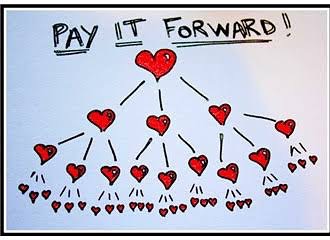
Some say there is no such thing as a selfless act, and that might be true, but what's the harm in getting a little satisfaction from doing something nice for someone else. A small selfless act on a Monday morning can help start somebody else's day with a smile and probably yours too. Buy a homeless person some breakfast, offer someone a lift to work, give your seat up on the train and you might just start a chain of good deeds. Try thinking about what you could do on Sunday night, it might be hard to think of anything apart from being back in bed on a Monday morning!
Enjoy Your Sunday Night

Typically, Saturdays are the day for activities Sundays are for winding down for the week. While a lazy Sunday morning is hard to beat, by 4 pm many people start thinking about work and not enjoying their last few hours of the weekend. Make plans for Sunday afternoon or early evening, a fitness class, meet up with old friends, a walk with the family. Spend the end of your weekend having fun rather than focusing on another week at work.
Love Your Job

Even the happiest employee in the world will, on some weekends, not like the idea of going back to work but there is a big difference between looking forward to the weekend and truly dreading going back to work. If you are spending more time resenting work than you are enjoying your time off or if you can't think of any positives about your current role it may be time to consider a career change. Just because you're unhappy doesn't mean you're in the wrong profession it may just be the company you work for is not right fit for you. Talking to a professional, respected recruiter can give you the help and guidance about other opportunities in your industry and find the right role for you.
Enjoy Your Journey to Work

The morning commute can be horrible on any day, but it always seems to be particularly busy on a Monday. Prepare something to entertain you on your way to work, download a series from Netflix, listen to a Podcast, create a playlist for the drive. It might be small but starting the day with something that will make you smile could get make you set for the day.
If the Monday-dread is getting too much and you are considering a new position our specialist team of recruiters can help guide you into the right job for you and identify what skills, you have that you may have overlooked. If you work in the Built Environment, HVAC/Refrigeration, Marketing or IT, check out our job page to see what roles are out there for you or alternatively you can give us a call on 0333 323 0733 to speak to one our industry specialists.
Our monthly update on the big built environment headlines this March!
HS2 UPDATE

Rarely does a day go by when HS2 is not in the news for some reason. This month is no different. There have been a number of updates on the project including Transport Secretary, Chris Grayling being warned of the ‘massive’ overrun cost of the project. The first interview with HS2 Boss Mark Thurston as well as plans to bring in a second-in-command for the chief executive, in a bid to strengthen the £55.7bn project’s executive team.
INTERNATIONAL WOMEN'S DAY
This month International’s Women’s Day campaign focused on highlighting the #pressforprogress campaign for women across all sectors. STEM companies, in particular, celebrated the improvements in the number of women in the industry but many also highlighted the big changes needed to increase the number of young women entering the profession. There were numerous publications released on the day one of which highlighted the history of women in engineering over the years. Read the article in full here.
DIGITAL CONSTRUCTION WEEK
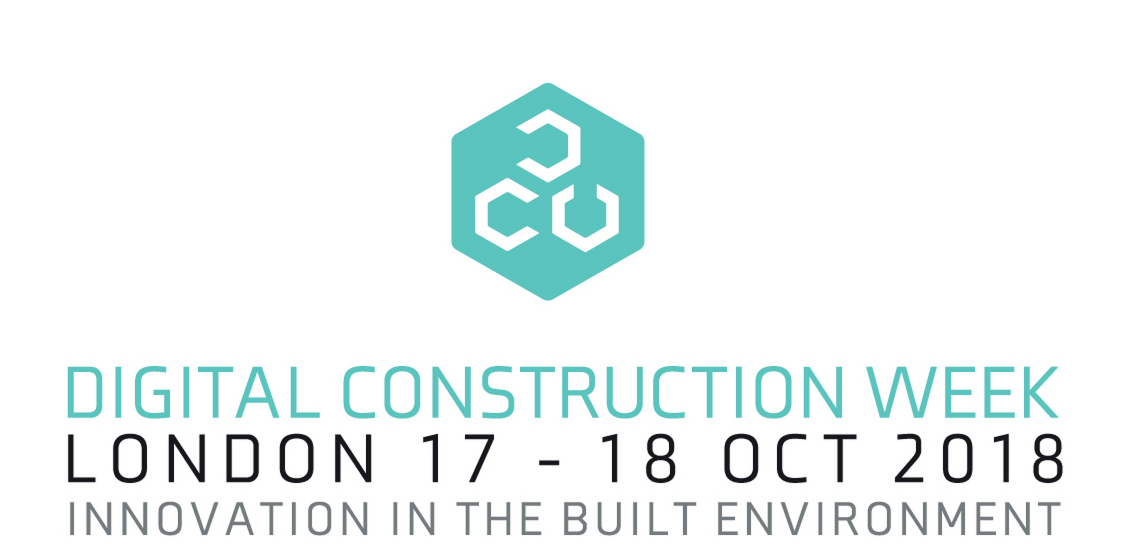
The call for papers for the digital construction week, set for October 2018 opened this month. This is a chance to share your experiences and expertise with the entire industry. The organises of construction week want to hear from organisations that have “an innovative project or story to share”. This is an opportunity to speak at one of the conferences six seminar theatres, registration closes on the 12th April 2018. For more information go to digitialconstructionweek.com
GRENFELL TOWER UPDATE
Eight months after the Grenfell tower disaster and there remains many questions by the public, community, politicians and the construction sector. This month there have been numerous news stories. Further questions have been raised on the building regulations and checks on the structure, including the safety of the fire doors. Read more here. In an attempt to gain further insight into what happened as the disaster unfolded independent spatial research group Forensic Architecture is working to create a 3D video to reveal details of the fire. The organisation plans for the 3D video to become a free public resource in the future. You can read full details of the plans at dezeen.com.
CREATIVE INDUSTRY FUND

On the 28th March, the UK government launched a £150m creative industries fund as part of the Governments new industrial strategy. As part of a Creative Industries Sector Deal announced by the Digital and Culture Secretary Matt Hancock, Business Secretary Greg Clark more than £150 million is being jointly invested by government and industry to help cultural and creative businesses across Britain thrive. For full info go to thedrum.com







